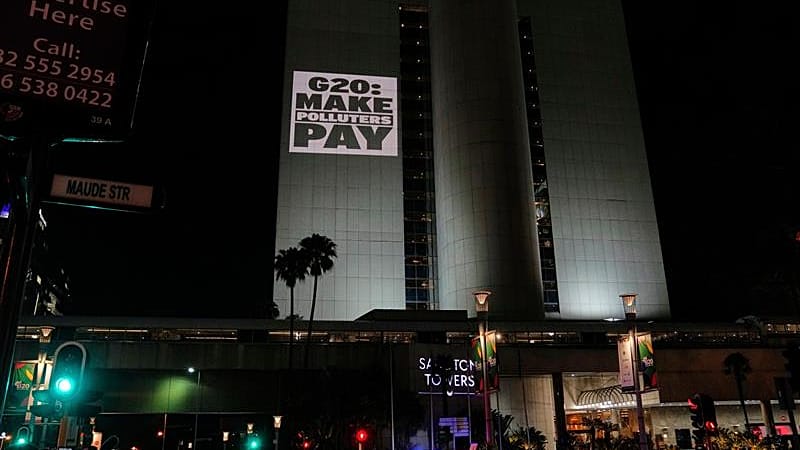Activists light up Johannesburg with a host of concerns ahead of G20 summit

As South Africa prepares to host world leaders for the first G20 summit on African soil, activists on Wednesday night illuminated Johannesburg’s skyline with their many concerns.
A series of posters and illustrations were projected onto buildings demanding urgent action on a wide range of issues including climate accountability, the global debt crisis, and women’s rights.
Local South African artists teamed up with activists from the Glasgow Actions Team to use buildings across the city as massive canvases to shine a light on what they see as some of the world’s biggest problems.
United Nations trade chief, Rebeca Grynspan, says that last year, 3.3 billion people were living in countries that pay more interest on their debts than they spend on health or education.
"We've got to drop the debt as a first port of call. The debt is highly and unfairly priced. And it is also killing our chances at development,” said Sekoetlane Phamodi, the director of the African Climate Foundation's New Economy Hub.
"What we are needing is clarity of voice and courage from the world leaders to ensure that we are really secured against hunger, secured against climate catastrophe, which is already happening, and that we also assured the dignity of development, which we deserve," he said.
The two-day summit opens on Saturday and is expected to attract leaders and top diplomats from more than 40 countries, as well as global institutions like the United Nations, the World Bank, the International Monetary Fund, and the World Trade Organization.
Host South Africa wants to prioritise issues affecting poor countries, including responses to disasters made worse by climate change.
South Africa will urge rich countries and international financial institutions to help more — a plea also being made at global climate talks in Brazil.
Climate financing has been a focus of sharp debate between rich and poor countries at major summits like the G20.
Rich countries agreed at last year’s United Nations climate summit to pool at least $300 billion a year by 2035 to help developing countries deal with the impacts of climate change and weather disasters.
But independent experts said much more — an estimated $1 trillion a year — was needed by 2030.
One of the world’s largest polluters, the United States, will not be attending this weekend’s G20 summit.
It is boycotting the event because of US President Donald Trump’s widely rejected claims that South Africa is violently persecuting its white Afrikaner minority.
Today

